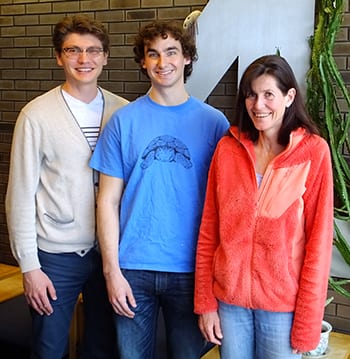News
Planting a Passion for Research
Marshall Tyler, a Cornell senior, has learned many things as an intern in Maria Harrison’s laboratory, from running a simple PCR reaction to editing a plant’s genome. But most importantly, he has developed a tremendous passion for research.
Soon, Tyler will bring this passion to Harvard University, where he’ll start a Ph.D. in chemical biology this fall. To recognize Harrison’s role in reaching this next step, Tyler nominated her for a mentoring award. Harrison is now the recipient of the 2015 Cornell University College of Agriculture and Life Sciences Faculty Excellence in Undergraduate Research Mentoring Award. Both are thrilled at each other’s success.
“I am delighted that my lab members and I were able to introduce Marshall to the excitement of scientific discovery and to inspire him to pursue research at graduate school,” said Harrison, a Professor and the William H. Crocker Scientist at BTI.
“She gave me a project with a lot of responsibility and independence which is something I don’t think you find in a lot of undergraduate lab experiences,” said Tyler. “It was a little intimidating at first, but it was a really rewarding experience. That’s why I nominated Maria for the award.”
For his internship project, Tyler, guided by Sergey Ivanov, a senior postdoctoral researcher in the Harrison laboratory, set out to use a new gene editing technology called CRISPR/Cas9, which can introduce mutations at very specific points in a genome. Scientists have used the technique in a variety of plants, animals and bacteria, but it had not yet been used successfully in their model plant, the barrel clover. Harrison’s laboratory uses this plant to study a symbiotic relationship between plants and soil fungi, called arbuscular mycorrhizae, but the relationship exists in almost all crop species.
Initially, Tyler attempted to deactivate a gene that plays a role in root hair development, but couldn’t seem to get plant to stop growing root hairs. Next, he tried the technique on a laboratory variety of barrel clover containing genes that constantly make a green fluorescent protein. This time, he was able to inactivate those genes, creating plant cells without a green glow.
Now that he has shown that CRISPR/Cas9 works in barrel clover, he is racing to optimize the process before graduating in May so that other laboratory members can use the technique in their work.
“Marshall and Sergey’s results are very exciting,” said Harrison. “Their ‘non-green’ roots herald a whole new era of reverse genetics in the Harrison lab.”
Tyler had initially focused on agriculture, but he then transitioned to studying chemistry during the completion of his interdisciplinary studies major in the College of Agriculture and Life Sciences. The idea of studying agriculture began to appeal to him after working on a farm for a summer in high school.
The summer after his sophomore year of college, Tyler did field work with Assistant Professor Michael Mazourek of the Horticulture Division at Cornell. Though he saw the importance of breeding disease-resistant crops, he longed to get deeper into the underlying mechanisms and genetics behind what he saw in the fields.
“I really liked being able to join the Harrison lab and to get an in-depth understanding of plant genetics and the microscopic community of fungus and how those interact,” he said.
When he took an organic chemistry class on the suggestion of his girlfriend, he realized the power of chemistry in manipulating biological systems. Ultimately, he would like to use chemistry to enhance human cognition, and he will likely end up in academia to facilitate this goal. He is interested in doing research to improve memory and learning processes in healthy individuals and to develop drugs to treat neurodegenerative diseases.
Tyler grew up in Santa Cruz, California but attended high school in Boston and has since lived in Ithaca. He will soon return to the Boston area after graduation to start his doctoral work.
“I definitely couldn’t have done it without this lab experience,” said Tyler. “It helped foster my passion for scientific research.”


